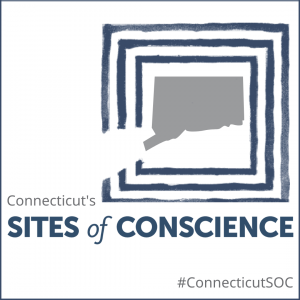IMMEDIATE RELEASE
August 3, 2022
CONTACT: AIMEE COTTON BOGUSH |abogush@cthumanities.org | 860-937-6648
Download Release Here
Five Locations Named as Connecticut’s Sites of Conscience – Connecting Past to Present, Moving from Memory to Action, Convening on August 9th
MIDDLETOWN, CT – CT Humanities (CTH), the state’s nonprofit affiliate of the National Endowment for the Humanities, names five locations as Connecticut’s Sites of Conscience.
The sites highlight the legacy, relevance, and persistence of issues which have influenced our state and our nation, and which continue to drive public discourse. CTH will support long-term civic engagement with the topics and locations that reflect on matters relating to human rights; social, economic, and environmental justice; carceral policy; education rights; and tribal affairs.
For the project, CTH collaborated with the International Coalition of Sites of Conscience (ICSC), a global network of historical sites, museums, and memory initiatives that connect past struggles to today’s movements for human rights – turning memorial into action.
Braden Painter, Director, Methodology and Practice, The International Coalition of Sites of Conscience (ISOC), explains, “The need to remember often competes with the equally strong pressure to forget. Even with the best of intentions – such as to promote reconciliation after deeply divided events by “turning the page” – erasing the past can prevent new generations from learning critical lessons and destroy opportunities to build a peaceful future.”
ICSC facilitated meetings with CTH and representatives from sites across the state to identify topics and corresponding locations. Working throughout 2020 and 2021, the group generated a list of prospective locations considering accessibility, geography, and relevance to major contemporary issues.
According to Jason Mancini, Executive Director, CTH, “It was important that the sites be existing organizations that work in both the past and present, speak to the dignity of all, share multi-layered and multi-generational stories, show diversity within communities, and prioritize equity in working with those most impacted to ensure community inclusion and agency.” Mancini adds, “The sites chosen embody all of these aspects.”
The five Connecticut Sites of Conscience are:
Mary & Eliza Freeman Center for History and Community, Bridgeport
The mission of The Mary & Eliza Freeman Center for History and Community is to restore, preserve, and ensure the viability of the Mary and Eliza Freeman Houses; teach the history of Connecticut Blacks; revitalize the surrounding South End community; and facilitate the preservation and revitalization of other African American, and greater Bridgeport historic/preservation communities.
Prudence Crandall Museum, Canterbury
Prudence Crandall, Connecticut’s Official State Heroine, opened a higher education academy for “young ladies of color” at her Canterbury Female Boarding School. Crandall and her students faced harassment and legal prosecution, yet classes continued until mob violence forced the school to close. Crandall’s trial impacted two U.S. Supreme Court cases, including Brown v. Board of Education, Topeka, demonstrating that the school’s legacy for equal education continues to be relevant today.
Old New-Gate Prison & Copper Mine, East Granby
Old New-Gate Prison & Copper Mine is nationally recognized as the first chartered copper mine and first state prison in early America. The museum strives to engage with historic and contemporary issues through the exploration and discovery of the site as a copper mine, prison, and tourist attraction.
Old New-Gate also houses the first ever Re-entry Hall of Change – a place to honor formerly incarcerated men and women who have made a great positive impact in their communities.
Connecticut’s Old State House, Hartford
History and civics meet at Connecticut’s Old State House. Located in the heart of Hartford, the building served as a home to all three branches of Connecticut state government from 1796 to 1878. Some of our state’s most important stories of freedom, democracy, and civic action – from the Amistad and Prudence Crandall trials to the Constitutional Convention of 1818 – connect to this National Historic Landmark. Today, Connecticut’s Old State House serves as a history museum, gathering spot, and place of civic exploration for thousands of local, national, and international visitors each year.
Pequot Hill, Mystic | Mashantucket (Western) Pequot and Eastern Pequot Tribal Nations
(Site interpretation at the Mashantucket Pequot Museum & Research Center, Mashantucket)
Pequot Hill, located west of the Mystic River, is the site of the first attempted genocide in North American in 1637 that left over 400 Pequot men, women, and children dead in less than an hour when the defensive fort erected on the hill was set on fire by the English during the Pequot War. The Mashantucket Pequot Museum & Research Center, the world’s largest tribally owned and operated museum of its kind, will serve as the interpretive venue for this important site. Located at the oldest continually occupied reservation in North America, the museum’s award-winning educational programs and tours have inspired millions of visitors through age-appropriate teachings on Native American history and culture from an Indigenous perspective.
Mancini urges CT residents to visit the sites, nearly all of which are free for Connecticut children and an accompanying adult as part of the CT Summer at the Museum initiative. The exhibits at The Mary & Eliza Freeman Center remain closed due to COVID-19, but their website provides opportunities to learn more about the effort to restore the Mary & Eliza Freeman houses and to explore historic Little Liberia, a seafaring community of free people of color in Bridgeport.
Mancini adds, “It is important to examine who creates the narratives around events and places in history. We hope to help the sites continue to take back the power of their stories and inspire greater understanding among residents of Connecticut.”
A convening and celebration of the sites will take place on August 9th at the Mashantucket Pequot Museum. Free and open to the public, the event will include panel discussions with community members and the media on who shapes histories, how those histories are told, and how they connect to the current issues we face. More information can be found here: https://cthumanities.org/ct-soc/#convening
The work with these five Connecticut’s Sites of Conscience locations is generously supported by the “Democracy and the Informed Citizen, Part 2” initiative, administered by the Federation of State Humanities Councils, and funded by the Mellon Foundation. It is expected the initiative will expand to include other sites in the future.
# # #
Connecticut Humanities (CTH) is an independent, nonprofit affiliate of the National Endowment for the Humanities. CTH connects people to the humanities through grants, partnerships, and collaborative programs. CTH projects, administration, and program development are supported by state and federal matching funds, community foundations and gifts from private sources. Learn more at cthumanities.org.
Federation of State Humanities Councils
As the membership organization for the nation’s state and jurisdictional humanities councils, the Federation of State Humanities Councils supports efforts to deepen our democracy using the humanities- literature, philosophy, history, ethics, arts, and the law. Through advocacy, events, partnerships, and shared resources, we unite the work and voices of the councils as they bring wisdom and vision into our everyday lives. Learn more at statehumanities.org.
The Mellon Foundation
The Mellon Foundation believes that the arts and humanities are where we express our complex humanity, and we believe that everyone deserves the beauty, transcendence, and freedom to be found there. Through our grants, we seek to build just communities enriched by meaning and empowered by critical thinking, where ideas and imagination can thrive. Learn more at mellon.org.
International Coalition of Sites of Conscience
Founded in 1999, the International Coalition of Sites of Conscience (“the Coalition”) is the only worldwide network of Sites of Conscience. With over 300 members in 65 countries, we build the capacity of these vital institutions through grants, networking, training, transitional justice mechanisms and advocacy. These members and partners remember a variety of histories and come from a wide range of settings – including long-standing democracies, countries struggling with legacies of violence, as well as post-conflict regions just beginning to address their transitional justice needs – but they are all united by their common commitment to connect past to present, memory to action. Learn more at sitesofconscience.org









